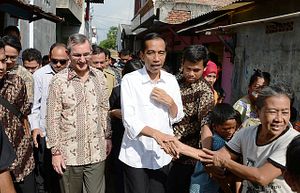It has been less than a year since Joko “Jokowi” Widodo won the Indonesian presidential election, calling on his vast support on social media and from young activists to defeat the better funded and better managed campaign of Prabowo Subianto. Although Jokowi blew a huge lead in the polls before the vote and then rallied to win the election, he still came into office shouldering extraordinarily high expectations from many Indonesians. Jokowi was the first president not to come from the elites who had dominated the country since Suharto’s time. He was also the first to rise up from a position outside of Jakarta, demonstrating the value of Indonesia’s process of decentralization and—supposedly—Jokowi’s commitment to democratization.
Jokowi’s campaign style, though at times ineffective, also bolstered these hopes. He refused to engage in the kinds of dirty and anti-democratic campaigning that his rival allegedly used. Jokowi also publicly disdained the grandiose trappings of Indonesian campaigns for a simple, direct approach that consisted of traveling widely, pressing the flesh, and giving straightforward, down-to-earth speeches about the practical policies he hoped to implement in office. The speeches sometimes were criticized by political commentators as banal, but their ordinary style of delivery, devoid of bombast, appealed to many Indonesians.
Since becoming president, Jokowi has indeed implemented some of the programs he promised on the campaign trail. Most notably, he has pushed through a subsidy program that will help the poorest Indonesians get health care and public education; the program is modeled on successful, similar programs that Jokowi launched during his mayoral career. Jokowi also made the difficult decision to cut Indonesian fuel subsidies, which long had been considered political dynamite—the previous president, Susilo Bambang Yudhoyono, did not cut subsidies in part, most likely, because he worried that the cuts would turn the population against him. (The drop in global oil prices made it far easier for Jokowi to cut fuel subsidies, of course.)
Yet in a recent poll, Jokowi’s popularity rating among Indonesians had fallen precipitously since the heady days of last autumn. Singapore’s Channel News Asia reported on a poll released about a month ago: “Poll Institute Puspol Indonesia reported that 74.6 per cent of respondents were dissatisfied with Mr. Widodo’s leadership.” Foreign nations are not thrilled by Jokowi’s presidency either: Brazil and the Netherlands have recalled their ambassadors from Jakarta after Jokowi proceeded with executions of suspected drug traffickers hailing from these countries. Although the death penalty is legal in Indonesia, a contrast from the Netherlands and Brazil where the death penalty has been abolished, what has rankled foreign countries is that Jokowi appears to have rejected any clemency claims even before he reads each specific clemency petition from death row inmates, according to numerous press accounts of Jokowi’s policies on punishment for drug dealers. Two Australian convicts face the death penalty imminently, a situation that threatens to undermine Indonesia-Australia relations as well—a bilateral relationship far more important to Jakarta than its ties with Brazil or the Netherlands.
The spat over the death penalty is not the reason Jokowi’s popularity has fallen with Indonesians. (In polls, Indonesians generally seem to support tough approaches to drug traffickers, although opinion on the death penalty is mixed in Indonesia.) His popularity has dropped at home amid controversy over his appointment of a police chief under investigation by Indonesia’s anti-corruption commissions, as well as the police’s subsequent move to arrest several of the anti-corruption commissioners. The arrests are seen by many Indonesian analysts as an attempt to muzzle the commission.
The police/corruption commission fracas has severely damaged Jokowi’s reputation as a clean politician—someone different from the previous generation of Indonesian leaders. Polling on why Jokowi’s popularity has dropped clearly shows that the denting of his Mr. Clean image is a major reason for the fall. In addition, the police chief appointment and other controversial ministerial appointments have raised questions about Jokowi’s style of governing, as has his decision to issue what seems like a blanket denial of all clemency petitions for death row inmates. Greg Fealy, a scholar of Indonesian politics at Australian National University, says that Jokowi’s domestic and foreign policy troubles raise a worry that “the harsh reality might be that Jokowi,” who never served in a national-level political post before assuming the presidency and has minimal foreign policy experience, “is not equipped to be a good president.”
Can Jokowi turn it around? It’s possible, but just as in the United States, in Indonesia the president usually can get the most done in the first year of his term, before inertia sets in and he or she loses some of the leverage gained by winning the presidential election. Jokowi is about halfway through his first year. He has six months to get his administration back on track and to push through other major policy initiatives.
Joshua Kurlantzick is a fellow for Southeast Asia at the Council on Foreign Relations. This post appears courtesy of CFR.org.

































